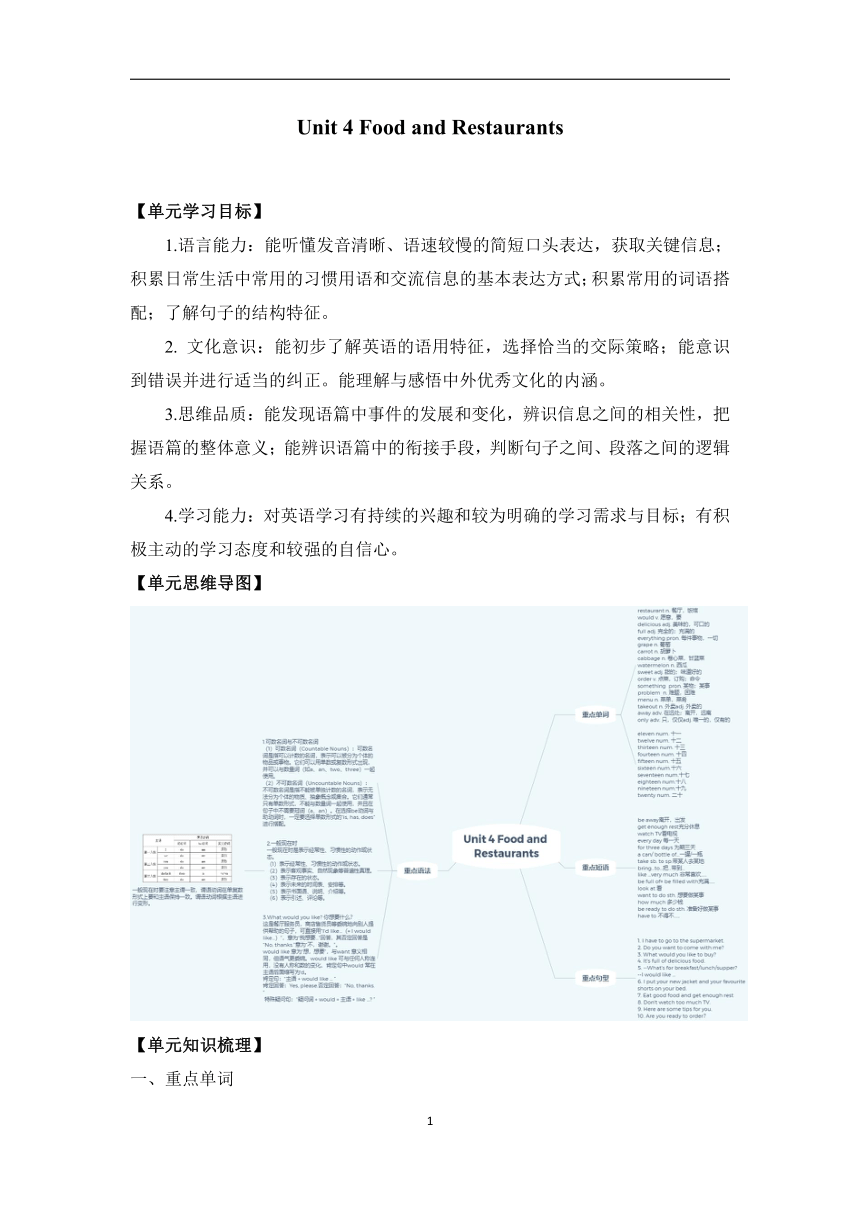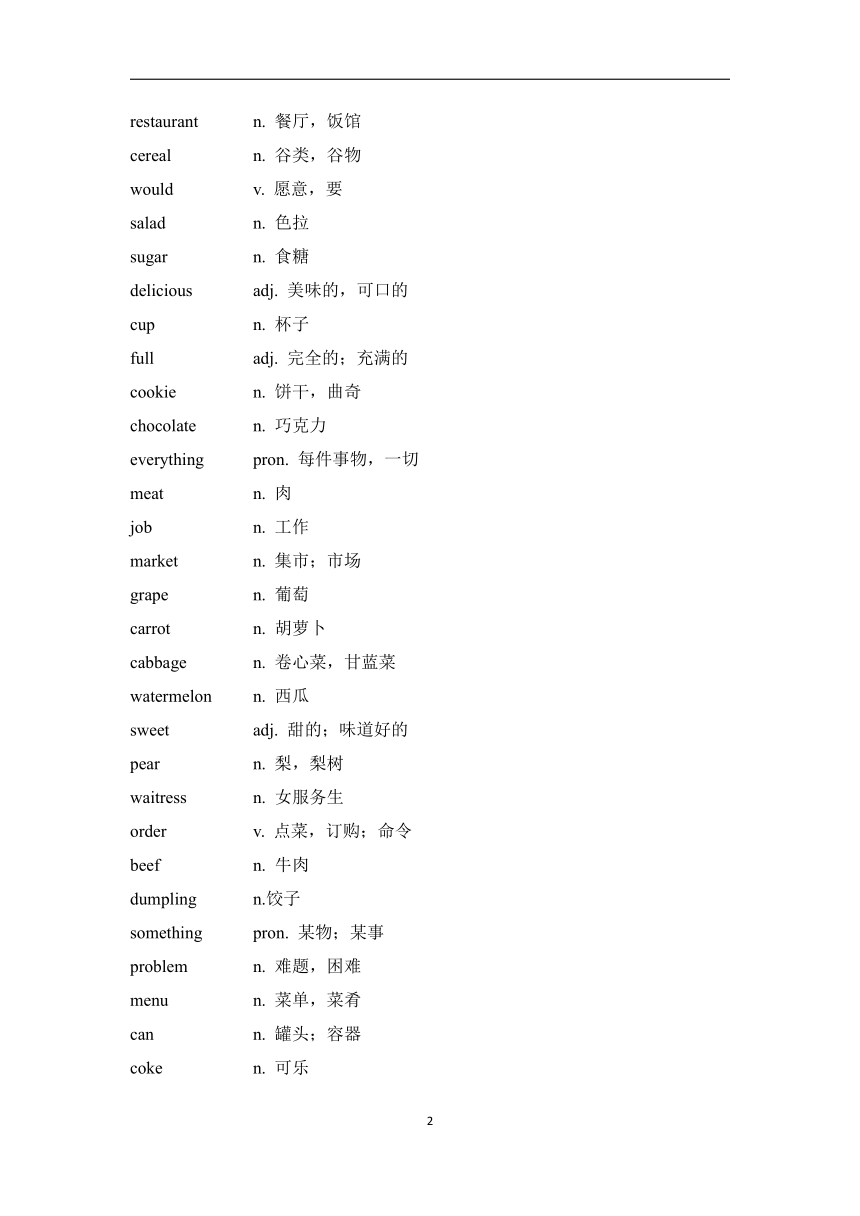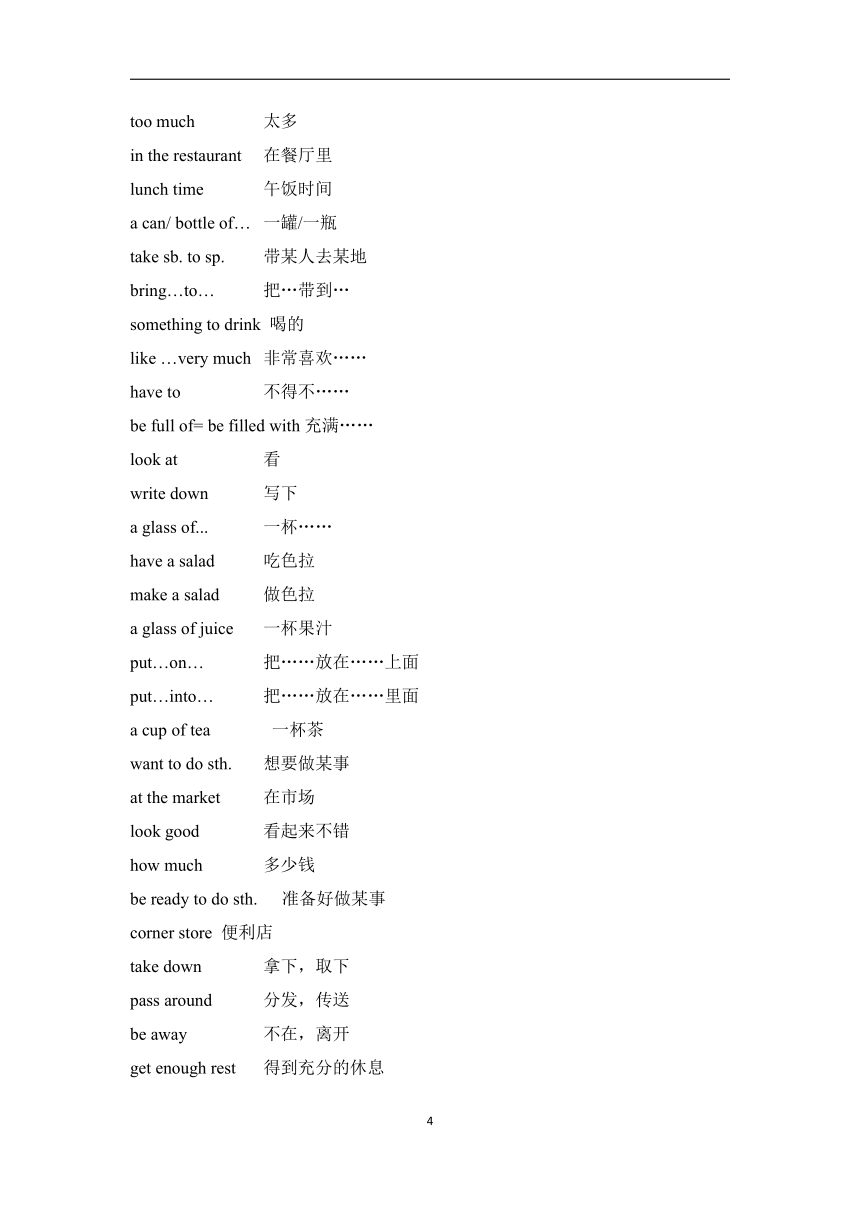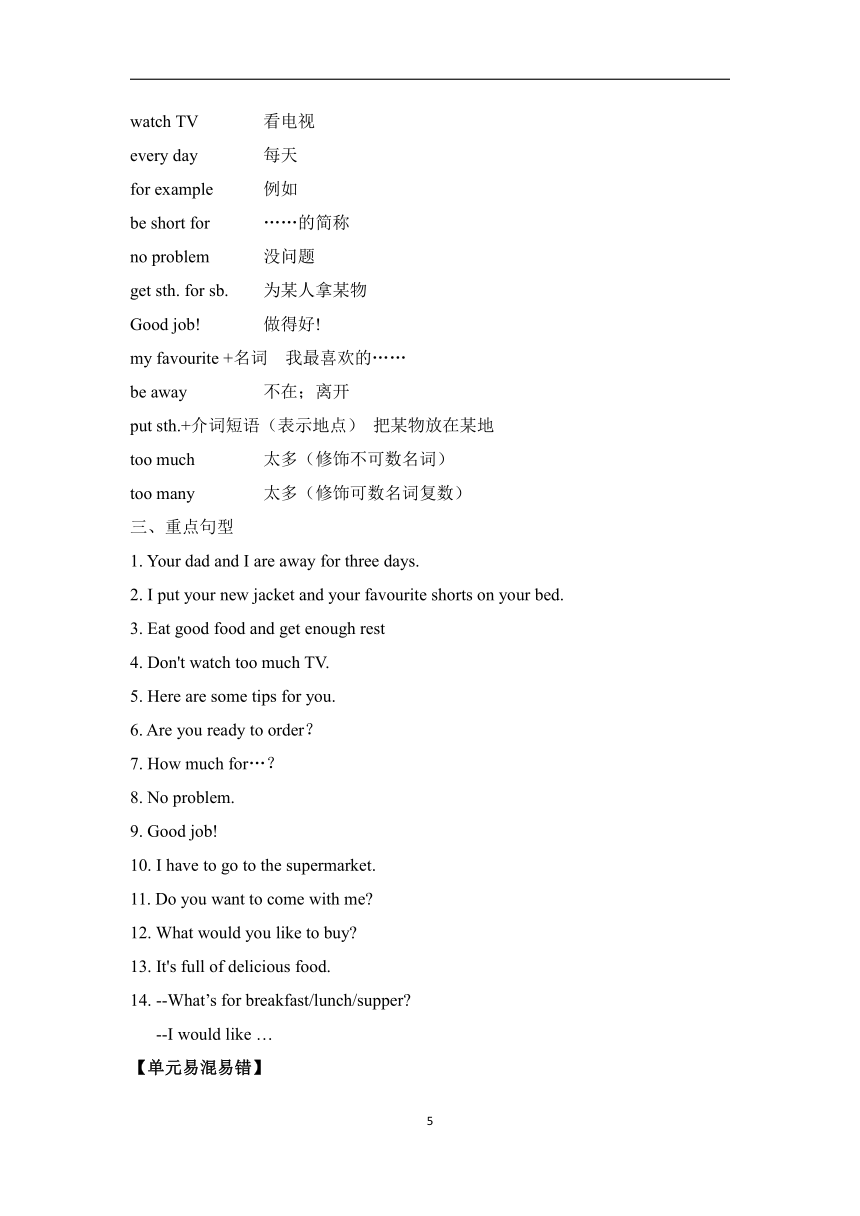Unit 4 Food and Restaurants单元知识清单学案
文档属性
| 名称 | Unit 4 Food and Restaurants单元知识清单学案 |

|
|
| 格式 | docx | ||
| 文件大小 | 190.5KB | ||
| 资源类型 | 教案 | ||
| 版本资源 | 冀教版 | ||
| 科目 | 英语 | ||
| 更新时间 | 2023-10-28 14:42:48 | ||
图片预览





文档简介
Unit 4 Food and Restaurants
【单元学习目标】
1.语言能力:能听懂发音清晰、语速较慢的简短口头表达,获取关键信息;积累日常生活中常用的习惯用语和交流信息的基本表达方式;积累常用的词语搭配;了解句子的结构特征。
2. 文化意识:能初步了解英语的语用特征,选择恰当的交际策略;能意识到错误并进行适当的纠正。能理解与感悟中外优秀文化的内涵。
3.思维品质:能发现语篇中事件的发展和变化,辨识信息之间的相关性,把握语篇的整体意义;能辨识语篇中的衔接手段,判断句子之间、段落之间的逻辑关系。
4.学习能力:对英语学习有持续的兴趣和较为明确的学习需求与目标;有积极主动的学习态度和较强的自信心。
【单元思维导图】
【单元知识梳理】
一、重点单词
restaurant n. 餐厅,饭馆
cereal n. 谷类,谷物
would v. 愿意,要
salad n. 色拉
sugar n. 食糖
delicious adj. 美味的,可口的
cup n. 杯子
full adj. 完全的;充满的
cookie n. 饼干,曲奇
chocolate n. 巧克力
everything pron. 每件事物,一切
meat n. 肉
job n. 工作
market n. 集市;市场
grape n. 葡萄
carrot n. 胡萝卜
cabbage n. 卷心菜,甘蓝菜
watermelon n. 西瓜
sweet adj. 甜的;味道好的
pear n. 梨,梨树
waitress n. 女服务生
order v. 点菜,订购;命令
beef n. 牛肉
dumpling n.饺子
something pron. 某物;某事
problem n. 难题,困难
menu n. 菜单,菜肴
can n. 罐头;容器
coke n. 可乐
bottle n. 瓶子;一瓶的量
corner n. 角;角落
money n. 钱;财富
clerk n. 职员
fridge n. 冰箱
pass v. 通过;传递
sandwich n. 三明治
takeout n. 外卖adj. 外卖的
tip n. 尖端,顶端;小费
away adv. 在远处;离开,远离
only adv. 只,仅仅adj. 唯一的,仅有的
tomato n.西红柿
eleven num. 十一
twelve num. 十二
thirteen num. 十三
fourteen num. 十四
fifteen num. 十五
sixteen num.十六
seventeen num.十七
eighteen num.十八
nineteen num.十九
twenty num. 二十
二、重点短语
be away 离开,出发
get enough rest 充分休息
watch TV 看电视
every day 每一天
for three days 为期三天
on your bed 在你的床上
too much 太多
in the restaurant 在餐厅里
lunch time 午饭时间
a can/ bottle of… 一罐/一瓶
take sb. to sp. 带某人去某地
bring…to… 把…带到…
something to drink 喝的
like …very much 非常喜欢……
have to 不得不……
be full of= be filled with充满……
look at 看
write down 写下
a glass of... 一杯……
have a salad 吃色拉
make a salad 做色拉
a glass of juice 一杯果汁
put…on… 把……放在……上面
put…into… 把……放在……里面
a cup of tea 一杯茶
want to do sth. 想要做某事
at the market 在市场
look good 看起来不错
how much 多少钱
be ready to do sth. 准备好做某事
corner store 便利店
take down 拿下,取下
pass around 分发,传送
be away 不在,离开
get enough rest 得到充分的休息
watch TV 看电视
every day 每天
for example 例如
be short for ……的简称
no problem 没问题
get sth. for sb. 为某人拿某物
Good job! 做得好!
my favourite +名词 我最喜欢的……
be away 不在;离开
put sth.+介词短语(表示地点) 把某物放在某地
too much 太多(修饰不可数名词)
too many 太多(修饰可数名词复数)
三、重点句型
1. Your dad and I are away for three days.
2. I put your new jacket and your favourite shorts on your bed.
3. Eat good food and get enough rest
4. Don't watch too much TV.
5. Here are some tips for you.
6. Are you ready to order?
7. How much for…?
8. No problem.
9. Good job!
10. I have to go to the supermarket.
11. Do you want to come with me
12. What would you like to buy
13. It's full of delicious food.
14. --What’s for breakfast/lunch/supper
--I would like …
【单元易混易错】
1.可数名词与不可数名词
(1)可数名词(Countable Nouns):可数名词是指可以计数的名词,表示可以被分为个体的物品或事物。它们可以用单数或复数形式出现,并可以与数量词(如a、an、two、three)一起使用。
① book(书)
单数形式:one book(一本书)
复数形式:two books(两本书)
② chair(椅子)
单数形式:a chair(一把椅子)
复数形式:three chairs(三把椅子)
(2)不可数名词(Uncountable Nouns):不可数名词是指不能被单独计数的名词,表示无法分为个体的物质、抽象概念或集合。它们通常只有单数形式,不能与数量词一起使用,并且在句子中不需要冠词(a、an)。在选择be动词与助动词时,一定要选择单数形式的“is, has, does”进行搭配。
① water(水)
无法计数,不能说"one water"或"two waters"。
正确表达是:some water(一些水)。
② information(信息)
无法计数,不能说"a information"或"two informations"。
正确表达是:some information(一些信息)。
2.一般现在时
一般现在时是表示经常性、习惯性的动作或状态。
(1)表示经常性、习惯性的动作或状态。
I brush my teeth twice a day.
我每天刷两次牙。
(2)表示客观事实、自然现象等普遍性真理。
The sun rises in the east.
太阳从东方升起。
(3)表示存在的状态。
He has a car.
他有一辆车。
(4)表示未来的时间表、安排等。
The train leaves at 10 am tomorrow.
明天火车10点出发。
(5)表示书面语、说明、介绍等。
The book describes the history of the country.
这本书描述了这个国家的历史。
(6)表示引述、评论等。
She says she likes the movie.
她说她喜欢这部电影。
一般现在时要注意主谓一致,谓语动词在单复数形式上要和主语保持一致。谓语动词根据主语进行变形。
主语 谓语动词
助动词 be动词 实义动词
第一人称 I do am 原形
we do are 原形
第二人称 you do are 原形
you do are 原形
第三人称 she/he/it does is +s/+es
they do are 原形
I am a student. 我是个学生。
He / She is a student. 他/她是个学生。
We/They are students. 我们/他们是学生。
You are my teacher. 你是我的老师。
You are my teachers. 你们是我的老师。
I have breakfast every day. 我每天都吃早餐。
We paly tennis every day. 我们每天都打网球。
You often take a walk in the evening. 你经常晚上散步。
The earth turns around the sun. 地球绕着太阳转。
She likes English very much. 她很喜欢英语。
Bill likes beef, but he doesn’t like chicken. 比尔喜欢牛肉但是不喜欢鸡肉。
实义动词的第三人称单数形式变化规则的特殊情况。
以辅音字母+y结尾的动词,要将y变成i再加-es;以s、x、o、sh、ch结尾的动词,要加-es;以元音字母+y结尾的动词,直接加-s
My father watches TV every night. 我爸爸每天晚上看电视。
She studies English very hard. 她学习英语很努力。
He goes home early every day. 他每天回家很早。
3. Time for breakfast! 到吃早餐时间了。
这是个省略句。完整的句子是“It's time for breakfast.”
“It's time for sth./doing sth.”是一种固定句型,表示“到做某事的时间了”。
“It's time (for sb) to do sth” 也可表示“到(某人)干某事的时间了”。
“Time/It's time for+名词’’和“Time/It's time to+动词原形”可互换,意义无区别。
4. Can I have some cereal and sugar,please 我可以吃些麦片和糖吗
some意为“一些",可修饰可数名词复数和不可名词,常用于肯定句中,在疑问句和否定句中常用any。表示请求、建议、征求对方意见及邀请的问句中也用some。
Would you like some coffee
喝点咖啡怎么样
Why don’t you buy some sweets
你为什么不买些糖果呢
5. What would you like 你想要什么?
这是餐厅服务员,商店售货员等委婉地向别人提供帮助的句子,可直接用“I'd like…(= I would like…)”,意为“我想要…”回答,其否定回答是“No, thanks.”意为“不,谢谢。”。
would like 意为“想,想要”,与want 意义相同,但语气更委婉。would like 可与任何人称连用,没有人称和数的变化,肯定句中would 常在主语后面缩写为'd。
肯定句:“主语 + would like … ”
如:I'd like a cup of tea.我想要一杯茶.
一般疑问句:“Would + 主语 + like … ”。
肯定回答:Yes, please.否定回答:“No, thanks.”
如:---Would you like a cup of tea?我想要一杯茶吗?
--- Yes, please./No, thanks.
特殊疑问句:“疑问词 + would + 主语 + like … ”
如:-- What would you like, sir ?我想什么,先生?
--- I'd like some cereal.我想要一些美片粥。
6. Are you ready to order 你们准备好点菜了吗
这是服务员询问客人是否点菜的常用语。此句是以be开头的一般疑问句,可以用yes/no来回答。但在实际交际中,常用Yes,please.代替Yes,I am.它比常规性肯定回答更礼貌,please体现出对他人的尊重。
--Do you want to order now
--Yes, I'd like a hamburger and a can of coke.
7. How much are the noodles 面条多少钱
(1)询问价格可用“How much+be+主语 ”来表示,其中be动词的单复数形式要由主语来定。回答时可用“主语+be+价格”,也可直接说钱数,也可用“钱数+for+数词”表示。
--How much are the chairs
这些椅子多少钱
--(They are) 80 yuan.
(它们)80元。
(2)询问单位数量的物品价格时,也可用“How much for+单位名词?”。
如:How much for a pen 一支钢笔多少钱?
(3)how much还可用于询问不可数名词的量,其结构为“How much+不可数名词+一般疑问句”
How much water do you want 你想要多少水?
8. Can I help you 我可以帮你吗?
Can I help you?类似的说法还有May I help you?或What can I do for you?这几句都是主动向别人提供帮助的常用语。它们的使用范围很广泛,随着场合的不同含义也不同。例如:在商店,售货员的意思是“你想买些什么东西?”;在饭店,服务员的意思是“你要吃点什么?”;在车站、飞机场等,售票员的意思是“你要乘坐哪趟车/飞机?”;在图书馆,管理员的意思是“你想借些什么书?”等等。此句的答语也会随着说话的场合的不同而不同。在商店购物时,我们常用以下几种答语:I want to buy…我想要买……;I'd like…我想要……;I'd like… for sb. 我想要为某人买……;I'd like to look at…我想要看一看……;I'm looking for…我正在找……;I'd like to look for…我想要找……;Yes, please. 或No, thanks.
9. 祈使句
表示请求、命令、建议等句子,通常说话的对象是第二人称you,you常被省略,动词原形位于句首。否定的祈使句,在肯定句前加“Don’t”。
Don't watch too much TV.
不要看太久电视。
Have a glass of milk every day.
每天都要喝一杯牛奶。
【单元对接中考】
1.【2023年广西】—Nana, happy birthday to you!
—___________.
A. Thank you B. You’re welcome C. Goodbye
2.【2023年广西】 —Cindy, do you know Wan Buyan
—___________ He received the title “Role Model of the Times” in May, 2023.
A. Yes, there is. B. Yes, he will C. Yes, I do
3.【2023年河北】 Breakfast ___________ every day for people aged over 60 for free in this village.
A. provides B. provided C. is provided D. was provided
4.【2023年湖北黄冈、孝感、咸宁】—Look at the sign. What does it mean
—It means we should ________ the rubbish ________ the proper rubbish bins.
A. put; into B. throw; around C. mix; into D. try; on
5.【2023年湖北荆州】—Would you like to play basketball with us tomorrow
—_______, but these days I'm too busy with the singing competition.
A. I’ll take your suggestion B. I’m sorry to hear that
C. That sounds like fun D. With pleasure
6.【2023年江西】—Kevin, could you pass me some ________ It’s so hot today. I’m really thirsty.
—OK. Here you are.
A. rice B. bread C. water D. chicken
7.【2023年山东滨州】—Chinese chess player Ding Liren has done ________ he can in chess and has put all that he has into the games.
—Yes, and he has become chess world champion (冠军) recently.
A. everything B. nothing C. something D. none
8.【2023年浙江宁波】We help the farmers near our school to pick ________ (西红柿) every year.
答案以及解析
1. 答案:A
解析:本题考查交际用语。收到别人的生日祝福应该表示感谢,故A项“谢谢你”符合题意。
2. 答案:C
解析:本题考查一般疑问句的肯定回答。句意:"辛迪,你知道万步炎吗?" "是的,我知道。他在2023年5月荣获了‘时代楷模’的称号"。问句为一般疑问句,根据题干中的"do you..."可知,肯定回答应用"Yes, I do.",故选C。
3. 答案:C
解析:本题考查动词的时态和语态。句意:在这个村庄,60岁以上的人每天可以免费享用早餐。此处主语Breakfast与谓语动词provide之间存在动宾关系,应用被动语态;再根据时间状语"every day"可知应用一般现在时。故选C。
4. 答案:A
解析:本题考查动词短语。结合常识可知,此处是说,我们应该把垃圾放进合适的垃圾桶里。put...into...表示"把……放入……",符合题意。
5. 答案:C
解析:本题考查交际用语。—你明天想和我们一起打篮球吗 —听起来很有意思,但我这些天忙着准备歌唱比赛。A项意为“我会采纳你的建议”;B项意为“听到这个消息我很难过”;C项意为“听起来很有趣”;D项意为“非常愿意”。故C项符合语境。
6. 答案:C
解析:本题考查名词。根据设空后的"今天很热。我很渴"可知,此处表示"凯文,你能递给我一些水吗?"。故选C。
7. 答案:A
解析:本题考查代词。—中国棋手丁立人已经在国际象棋上倾尽所有努力,并把他所有的一切都投入到比赛中。—是的,最近他已成为国际象棋冠军。根据句意可知,此处指的是尽一切努力,故所缺的词是everything"每件事,一切"。
8. 答案:tomatoes
解析:句意:我们每年都帮助学校附近的农民摘西红柿。tomato“西红柿”,可数名词,此处应用复数表示泛指,故填tomatoes。
2
【单元学习目标】
1.语言能力:能听懂发音清晰、语速较慢的简短口头表达,获取关键信息;积累日常生活中常用的习惯用语和交流信息的基本表达方式;积累常用的词语搭配;了解句子的结构特征。
2. 文化意识:能初步了解英语的语用特征,选择恰当的交际策略;能意识到错误并进行适当的纠正。能理解与感悟中外优秀文化的内涵。
3.思维品质:能发现语篇中事件的发展和变化,辨识信息之间的相关性,把握语篇的整体意义;能辨识语篇中的衔接手段,判断句子之间、段落之间的逻辑关系。
4.学习能力:对英语学习有持续的兴趣和较为明确的学习需求与目标;有积极主动的学习态度和较强的自信心。
【单元思维导图】
【单元知识梳理】
一、重点单词
restaurant n. 餐厅,饭馆
cereal n. 谷类,谷物
would v. 愿意,要
salad n. 色拉
sugar n. 食糖
delicious adj. 美味的,可口的
cup n. 杯子
full adj. 完全的;充满的
cookie n. 饼干,曲奇
chocolate n. 巧克力
everything pron. 每件事物,一切
meat n. 肉
job n. 工作
market n. 集市;市场
grape n. 葡萄
carrot n. 胡萝卜
cabbage n. 卷心菜,甘蓝菜
watermelon n. 西瓜
sweet adj. 甜的;味道好的
pear n. 梨,梨树
waitress n. 女服务生
order v. 点菜,订购;命令
beef n. 牛肉
dumpling n.饺子
something pron. 某物;某事
problem n. 难题,困难
menu n. 菜单,菜肴
can n. 罐头;容器
coke n. 可乐
bottle n. 瓶子;一瓶的量
corner n. 角;角落
money n. 钱;财富
clerk n. 职员
fridge n. 冰箱
pass v. 通过;传递
sandwich n. 三明治
takeout n. 外卖adj. 外卖的
tip n. 尖端,顶端;小费
away adv. 在远处;离开,远离
only adv. 只,仅仅adj. 唯一的,仅有的
tomato n.西红柿
eleven num. 十一
twelve num. 十二
thirteen num. 十三
fourteen num. 十四
fifteen num. 十五
sixteen num.十六
seventeen num.十七
eighteen num.十八
nineteen num.十九
twenty num. 二十
二、重点短语
be away 离开,出发
get enough rest 充分休息
watch TV 看电视
every day 每一天
for three days 为期三天
on your bed 在你的床上
too much 太多
in the restaurant 在餐厅里
lunch time 午饭时间
a can/ bottle of… 一罐/一瓶
take sb. to sp. 带某人去某地
bring…to… 把…带到…
something to drink 喝的
like …very much 非常喜欢……
have to 不得不……
be full of= be filled with充满……
look at 看
write down 写下
a glass of... 一杯……
have a salad 吃色拉
make a salad 做色拉
a glass of juice 一杯果汁
put…on… 把……放在……上面
put…into… 把……放在……里面
a cup of tea 一杯茶
want to do sth. 想要做某事
at the market 在市场
look good 看起来不错
how much 多少钱
be ready to do sth. 准备好做某事
corner store 便利店
take down 拿下,取下
pass around 分发,传送
be away 不在,离开
get enough rest 得到充分的休息
watch TV 看电视
every day 每天
for example 例如
be short for ……的简称
no problem 没问题
get sth. for sb. 为某人拿某物
Good job! 做得好!
my favourite +名词 我最喜欢的……
be away 不在;离开
put sth.+介词短语(表示地点) 把某物放在某地
too much 太多(修饰不可数名词)
too many 太多(修饰可数名词复数)
三、重点句型
1. Your dad and I are away for three days.
2. I put your new jacket and your favourite shorts on your bed.
3. Eat good food and get enough rest
4. Don't watch too much TV.
5. Here are some tips for you.
6. Are you ready to order?
7. How much for…?
8. No problem.
9. Good job!
10. I have to go to the supermarket.
11. Do you want to come with me
12. What would you like to buy
13. It's full of delicious food.
14. --What’s for breakfast/lunch/supper
--I would like …
【单元易混易错】
1.可数名词与不可数名词
(1)可数名词(Countable Nouns):可数名词是指可以计数的名词,表示可以被分为个体的物品或事物。它们可以用单数或复数形式出现,并可以与数量词(如a、an、two、three)一起使用。
① book(书)
单数形式:one book(一本书)
复数形式:two books(两本书)
② chair(椅子)
单数形式:a chair(一把椅子)
复数形式:three chairs(三把椅子)
(2)不可数名词(Uncountable Nouns):不可数名词是指不能被单独计数的名词,表示无法分为个体的物质、抽象概念或集合。它们通常只有单数形式,不能与数量词一起使用,并且在句子中不需要冠词(a、an)。在选择be动词与助动词时,一定要选择单数形式的“is, has, does”进行搭配。
① water(水)
无法计数,不能说"one water"或"two waters"。
正确表达是:some water(一些水)。
② information(信息)
无法计数,不能说"a information"或"two informations"。
正确表达是:some information(一些信息)。
2.一般现在时
一般现在时是表示经常性、习惯性的动作或状态。
(1)表示经常性、习惯性的动作或状态。
I brush my teeth twice a day.
我每天刷两次牙。
(2)表示客观事实、自然现象等普遍性真理。
The sun rises in the east.
太阳从东方升起。
(3)表示存在的状态。
He has a car.
他有一辆车。
(4)表示未来的时间表、安排等。
The train leaves at 10 am tomorrow.
明天火车10点出发。
(5)表示书面语、说明、介绍等。
The book describes the history of the country.
这本书描述了这个国家的历史。
(6)表示引述、评论等。
She says she likes the movie.
她说她喜欢这部电影。
一般现在时要注意主谓一致,谓语动词在单复数形式上要和主语保持一致。谓语动词根据主语进行变形。
主语 谓语动词
助动词 be动词 实义动词
第一人称 I do am 原形
we do are 原形
第二人称 you do are 原形
you do are 原形
第三人称 she/he/it does is +s/+es
they do are 原形
I am a student. 我是个学生。
He / She is a student. 他/她是个学生。
We/They are students. 我们/他们是学生。
You are my teacher. 你是我的老师。
You are my teachers. 你们是我的老师。
I have breakfast every day. 我每天都吃早餐。
We paly tennis every day. 我们每天都打网球。
You often take a walk in the evening. 你经常晚上散步。
The earth turns around the sun. 地球绕着太阳转。
She likes English very much. 她很喜欢英语。
Bill likes beef, but he doesn’t like chicken. 比尔喜欢牛肉但是不喜欢鸡肉。
实义动词的第三人称单数形式变化规则的特殊情况。
以辅音字母+y结尾的动词,要将y变成i再加-es;以s、x、o、sh、ch结尾的动词,要加-es;以元音字母+y结尾的动词,直接加-s
My father watches TV every night. 我爸爸每天晚上看电视。
She studies English very hard. 她学习英语很努力。
He goes home early every day. 他每天回家很早。
3. Time for breakfast! 到吃早餐时间了。
这是个省略句。完整的句子是“It's time for breakfast.”
“It's time for sth./doing sth.”是一种固定句型,表示“到做某事的时间了”。
“It's time (for sb) to do sth” 也可表示“到(某人)干某事的时间了”。
“Time/It's time for+名词’’和“Time/It's time to+动词原形”可互换,意义无区别。
4. Can I have some cereal and sugar,please 我可以吃些麦片和糖吗
some意为“一些",可修饰可数名词复数和不可名词,常用于肯定句中,在疑问句和否定句中常用any。表示请求、建议、征求对方意见及邀请的问句中也用some。
Would you like some coffee
喝点咖啡怎么样
Why don’t you buy some sweets
你为什么不买些糖果呢
5. What would you like 你想要什么?
这是餐厅服务员,商店售货员等委婉地向别人提供帮助的句子,可直接用“I'd like…(= I would like…)”,意为“我想要…”回答,其否定回答是“No, thanks.”意为“不,谢谢。”。
would like 意为“想,想要”,与want 意义相同,但语气更委婉。would like 可与任何人称连用,没有人称和数的变化,肯定句中would 常在主语后面缩写为'd。
肯定句:“主语 + would like … ”
如:I'd like a cup of tea.我想要一杯茶.
一般疑问句:“Would + 主语 + like … ”。
肯定回答:Yes, please.否定回答:“No, thanks.”
如:---Would you like a cup of tea?我想要一杯茶吗?
--- Yes, please./No, thanks.
特殊疑问句:“疑问词 + would + 主语 + like … ”
如:-- What would you like, sir ?我想什么,先生?
--- I'd like some cereal.我想要一些美片粥。
6. Are you ready to order 你们准备好点菜了吗
这是服务员询问客人是否点菜的常用语。此句是以be开头的一般疑问句,可以用yes/no来回答。但在实际交际中,常用Yes,please.代替Yes,I am.它比常规性肯定回答更礼貌,please体现出对他人的尊重。
--Do you want to order now
--Yes, I'd like a hamburger and a can of coke.
7. How much are the noodles 面条多少钱
(1)询问价格可用“How much+be+主语 ”来表示,其中be动词的单复数形式要由主语来定。回答时可用“主语+be+价格”,也可直接说钱数,也可用“钱数+for+数词”表示。
--How much are the chairs
这些椅子多少钱
--(They are) 80 yuan.
(它们)80元。
(2)询问单位数量的物品价格时,也可用“How much for+单位名词?”。
如:How much for a pen 一支钢笔多少钱?
(3)how much还可用于询问不可数名词的量,其结构为“How much+不可数名词+一般疑问句”
How much water do you want 你想要多少水?
8. Can I help you 我可以帮你吗?
Can I help you?类似的说法还有May I help you?或What can I do for you?这几句都是主动向别人提供帮助的常用语。它们的使用范围很广泛,随着场合的不同含义也不同。例如:在商店,售货员的意思是“你想买些什么东西?”;在饭店,服务员的意思是“你要吃点什么?”;在车站、飞机场等,售票员的意思是“你要乘坐哪趟车/飞机?”;在图书馆,管理员的意思是“你想借些什么书?”等等。此句的答语也会随着说话的场合的不同而不同。在商店购物时,我们常用以下几种答语:I want to buy…我想要买……;I'd like…我想要……;I'd like… for sb. 我想要为某人买……;I'd like to look at…我想要看一看……;I'm looking for…我正在找……;I'd like to look for…我想要找……;Yes, please. 或No, thanks.
9. 祈使句
表示请求、命令、建议等句子,通常说话的对象是第二人称you,you常被省略,动词原形位于句首。否定的祈使句,在肯定句前加“Don’t”。
Don't watch too much TV.
不要看太久电视。
Have a glass of milk every day.
每天都要喝一杯牛奶。
【单元对接中考】
1.【2023年广西】—Nana, happy birthday to you!
—___________.
A. Thank you B. You’re welcome C. Goodbye
2.【2023年广西】 —Cindy, do you know Wan Buyan
—___________ He received the title “Role Model of the Times” in May, 2023.
A. Yes, there is. B. Yes, he will C. Yes, I do
3.【2023年河北】 Breakfast ___________ every day for people aged over 60 for free in this village.
A. provides B. provided C. is provided D. was provided
4.【2023年湖北黄冈、孝感、咸宁】—Look at the sign. What does it mean
—It means we should ________ the rubbish ________ the proper rubbish bins.
A. put; into B. throw; around C. mix; into D. try; on
5.【2023年湖北荆州】—Would you like to play basketball with us tomorrow
—_______, but these days I'm too busy with the singing competition.
A. I’ll take your suggestion B. I’m sorry to hear that
C. That sounds like fun D. With pleasure
6.【2023年江西】—Kevin, could you pass me some ________ It’s so hot today. I’m really thirsty.
—OK. Here you are.
A. rice B. bread C. water D. chicken
7.【2023年山东滨州】—Chinese chess player Ding Liren has done ________ he can in chess and has put all that he has into the games.
—Yes, and he has become chess world champion (冠军) recently.
A. everything B. nothing C. something D. none
8.【2023年浙江宁波】We help the farmers near our school to pick ________ (西红柿) every year.
答案以及解析
1. 答案:A
解析:本题考查交际用语。收到别人的生日祝福应该表示感谢,故A项“谢谢你”符合题意。
2. 答案:C
解析:本题考查一般疑问句的肯定回答。句意:"辛迪,你知道万步炎吗?" "是的,我知道。他在2023年5月荣获了‘时代楷模’的称号"。问句为一般疑问句,根据题干中的"do you..."可知,肯定回答应用"Yes, I do.",故选C。
3. 答案:C
解析:本题考查动词的时态和语态。句意:在这个村庄,60岁以上的人每天可以免费享用早餐。此处主语Breakfast与谓语动词provide之间存在动宾关系,应用被动语态;再根据时间状语"every day"可知应用一般现在时。故选C。
4. 答案:A
解析:本题考查动词短语。结合常识可知,此处是说,我们应该把垃圾放进合适的垃圾桶里。put...into...表示"把……放入……",符合题意。
5. 答案:C
解析:本题考查交际用语。—你明天想和我们一起打篮球吗 —听起来很有意思,但我这些天忙着准备歌唱比赛。A项意为“我会采纳你的建议”;B项意为“听到这个消息我很难过”;C项意为“听起来很有趣”;D项意为“非常愿意”。故C项符合语境。
6. 答案:C
解析:本题考查名词。根据设空后的"今天很热。我很渴"可知,此处表示"凯文,你能递给我一些水吗?"。故选C。
7. 答案:A
解析:本题考查代词。—中国棋手丁立人已经在国际象棋上倾尽所有努力,并把他所有的一切都投入到比赛中。—是的,最近他已成为国际象棋冠军。根据句意可知,此处指的是尽一切努力,故所缺的词是everything"每件事,一切"。
8. 答案:tomatoes
解析:句意:我们每年都帮助学校附近的农民摘西红柿。tomato“西红柿”,可数名词,此处应用复数表示泛指,故填tomatoes。
2
同课章节目录
- Unit 1 School and friends
- Lesson 1 Hello!
- Lesson 2 Teacher and Students
- Lesson 3 Welcome to Our School
- Lesson 4 What Is It?
- Lesson 5 May I Have a Book?
- Lesson 6 Things for School
- Unit 2 Colours and Clothes
- Lesson 7 Jenny's New Skirt
- Lesson 8 Danny's Favourit Colou
- Lesson 9 Whose Coat Is This?
- Lesson 10 Clothes for a Cold Day
- Lesson 11 Clothes around the World
- Lesson 12 Let's Go Shopping!
- Unit 3 Body Parts and Feelings
- Lesson 13 Body Parts
- Lesson 14 Colours and Feelings
- Lesson 15 Tall or Short
- Lesson 16 Happy or Sad
- Lesson 17 Seeing a Docto
- Lesson 18 We All Look Different!
- Unit 4 Food and Restaurants
- Lesson 19 Time for Breakfast!
- Lesson 20 I Like the Supermarket!
- Lesson 21 At the Market
- Lesson 22 In the Restaurant
- Lesson 23 The Corner Store
- Lesson 24 Eat Good Food!
- Unit 5 Family and Home
- Lesson 25 Jenny's Family
- Lesson 26 Li Ming's Family
- Lesson 27 Danny at Home
- Lesson 28 A Family Picnic
- Lesson 29 A Birthday Card
- Lesson 30 Grandma's Birthday Party
- Unit 6 Let's Go!
- Lesson 31 Let's Go to the Bookstore!
- Lesson 32 At the Supermarket
- Lesson 33 Let's Go to the Zoo!
- Lesson 34 On the Farm
- Lesson 35 Let's Go to the Museum!
- Lesson 36 Let's Go to the Movie Theatre!
- Unit 7 Days and Months
- Lesson 37 Seasons and Weathe
- Lesson 38 Nick's Busy Month
- Lesson 39 A Class Calenda
- Lesson 40 When Is Your Birthday?
- Lesson 41 Holidays
- Lesson 42 Happy Holidays!
- Unit 8 Countries around the world
- Lesson 43 Directions
- Lesson 44 Jack's Goodbye Party
- Lesson 45 China
- Lesson 46 Canada and the U.S.
- Lesson 47 The U.K. and Australia
- Lesson 48 English-Speaking Countries
